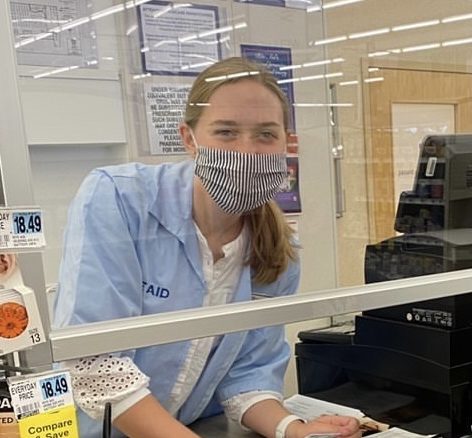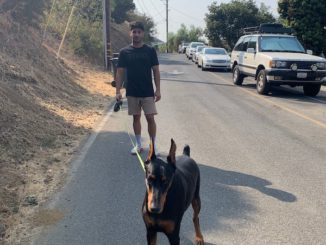
Pepperdine students are working as frontline essential workers during the pandemic to help their communities.
From providing life-saving medical care to essential grocery services, students are putting themselves at risk to fill important roles within the food and healthcare industries.
An EMT, two pharmacists and three grocery store workers shared their work experiences during the pandemic. Each student said they have a newfound appreciation for essential workers.
“It did shake my understanding of what it means to be an essential worker because I got to be one,” junior chemistry major Bridget Johnson said. “During a pandemic, there’s no compromising going to work. It’s always important.”
Students were confronted with having emotionally-charged conversations, constantly being exposed to COVID-19 encountering disrespectful and anti-mask customers and working long hours.
Working as an EMT during the pandemic
Dreaming of a career in emergency or addiction medicine, senior biology major Lauren Dedmon said she joined the Phoenix Fire Department crisis response team as an EMT in the fall. There, she helped her community with the suffering and loss from the pandemic.
“There was a lot of grief and sadness with COVID going on,” Dedmon said. “It was nice to be able to be there for my community in that way and give resources.”
Working 12-hour shifts, oftentimes back to back, Dedmon said she was called to handle mental health and substance abuse cases. She also helped people experiencing grief and high-stress incidents, such as the death of an infant and delivering death notifications.
“There’s a lot of really hard, emotionally-charged conversations that you have to have with people that can be tough,” Dedmon said.
In January, Dedmon said she started COVID-19 testing as an EMT. The drive-through testing facility where she worked did more than 500 COVID-19 tests each day during the holiday season. Dedmon even had the opportunity to put her Pepperdine lab skills to action, as she ran the 12-hour COVID-19 tests on her own.
Being on the frontlines, Dedmon said she was faced with the devastating reality of the pandemic.
“Patients will talk about their experiences and a lot of times … they have already lost multiple family members to COVID,” Dedmon said. “There’s a lot of anxiety, and you just have to not be affected by it.”
One woman who came through the COVID-19 testing site told Dedmon she lost her mom, dad and three siblings to COVID-19. Dedmon said the woman was incredibly anxious to take the test, as she feared to be the next family member to die from the virus.
“I had never heard someone that lost literally that many family members in such a short period of time,” Dedmon said. “It was wild.”
Dedmon said limiting her exposure to the virus was also a challenge. When she first started working for the crisis response team, eye protection — a crucial element of PPE — had run out, putting her at greater risk of contracting the virus.
As of March 25, the CDC reported more than 450,000 cases of COVID-19 among healthcare personnel in the United States.
Working as a pharmacy worker during the pandemic
Johnson and first-year biology major Melanie Tadros worked as pharmacy assistants during the pandemic to provide life-saving medications and immunizations to their communities.
“It’s scary working in a pharmacy at such a young age because everything you do is so critical to people’s lives,” CVS Pharmacy Assistant Tadros said.
Tadros said one of her co-workers even ended up contracting the virus.
“I was freaking out,” Tadros said. “I was working directly next to her the entire day, and it was just the worst news finding out that I was in contact with someone who had COVID.”
Following all the safety measures to limit the risk of exposure also was a challenge, Tadros said.
“You have to wear double masks, face shield, sanitize every five minutes,” Tadros said. “It’s really tough.”
In addition to working in the pharmacy, Tadros said she has helped pharmacists clean and prep vaccination stations at clinics providing COVID-19 vaccines for long-term care facilities and healthcare workers.
When Pepperdine canceled Johnson’s summer chemistry research project, she got a job working as a Rite Aid pharmacy assistant. She was responsible for organizing medication, helping people pick up prescriptions, preparing people for immunization and keeping the pharmacy clean.
Johnson interacted with at least 50 customers in each eight-hour work shift, as her pharmacy filled about 150-200 prescriptions a day.
In addition to the heavy workday, Johnson said wearing a mask eight hours straight everyday gave her really bad headaches.
“I never thought you could get a headache from a mask,” Johnson said. “But if you wear it for that much time without breaks, it can get kind of hard.”
Working as a grocery store worker during the pandemic
Despite their low salaries, grocery store workers worked long hours and put themselves at risk every day to provide people with access to food. Among these workers were students Andrea Mella, first-year integrated marketing communication major; Kelley Griffin, junior rhetoric and leadership major; and Jacob Piccuito, junior business administration major.
COVID-19 infected more than 30,100 grocery store workers and at least 137 died from the virus, The United Food and Commercial Workers Union told CNN on Feb. 18.
Mella said she started working on the grocery team at the Malibu Whole Foods in December. She opened around 200 boxes of incoming shipments a day, stocked shelves and helped customers navigate through the store.
“People need to go to grocery stores and people need to feed themselves, buy food and stuff like that,” Mella said. “It’s really important that we do our jobs correctly and that we don’t slack off.”
Every single time an employee tested positive for COVID-19, Mella said she would receive a heart-stopping text notification. In less than four months, she received eight of these, and one person on her team caught the virus.
“You’re always putting yourself at risk,” Mella said. “You are putting the people that live with you at risk and the rest of the people that interact with you at risk.”
With an understaffed team, Mella was also working upward of 35 hours while taking classes.
“It was really, really hard for me to manage,” Mella said. “I was telling my boss I’m in school, I’m a full-time student and I work here part-time, but they’re scheduling me almost full-time shifts.”
Griffin worked as a courtesy clerk at the Calabasas Albertsons during the fall semester sweeping aisles, bagging groceries and stacking carts about 22 hours each week.
Hoping to save money, Piccuito started working as a store shopper at Malibu Whole Foods in February.
While trying to find groceries for customers, Piccuito said he started to see why grocery work is so essential.
“One day something could be gone, but the next day it’s fully stocked,” Picuitto said. “I think it just shows that to a point we are essential workers.”
Customer experiences
Tadros said she came across customers who did not follow social distancing guidelines or wear their masks properly, which made her fear for her health and that of her loved ones.
“It was actually scary once people started getting comfortable with the whole pandemic and the ‘anti-maskers people’ and a lot of people didn’t care,” Tadros said. “They would just come up to us not social distancing, right directly in front of us and … they will just be talking about their family members who currently have COVID.”
Similarly, Johnson said not all the customer interactions were positive due to the pandemic.
“Oftentimes, people have pent-up stress and anger and they’ll take that out on the pharmacy,” Johnson said. “There’s a few instances that I remember thinking, ‘Wow, I feel like I didn’t remember people acting like this before the pandemic.’”
Griffin also said it was very irritating when customers would not follow mask mandates to protect employees, especially when it was fairly difficult to social distance in the grocery store.
“There were some customers that would just refuse to wear masks even after we would ask,” Griffin said. “I felt like them not doing their part was just very annoying.”
In some instances customers even threatened violence, Griffin said. Police had to chase one anti-mask individual out of the store for his aggressive behavior.
Piccuito said he was discouraged to see a lack of appreciation or even respect for the workers at times. Many customers would simply leave baskets of produce they did not want randomly throughout the store adding more work for the workers. Some customers did not even acknowledge the workers at checkout.
“The biggest thing is just saying thank you — a lot of customers don’t even say that,” Piccuito said. “We will say ‘Have a nice day,’ and they’ll just not respond.”
Appreciation
The pandemic has made more people recognize how important essential workers are to the functioning and well-being of society.
“What the pandemic has done is it has created a whole new category of people that we feel we need to say thank you to,” Sociologist Professor Robin Perrin said.
Acknowledging the struggles of grocery workers, the L.A. County Board of Supervisors passed a hero-pay mandate that went into effect Feb. 26, adding $5 an hour hazard pay to their wages for 120 days, Jaclyn Cosgrove wrote in a Feb. 23 Los Angeles Times article.
Mella said her experience helped her see the incredible work and dedication that goes into making grocery stores run smoothly.
“I do have a different appreciation when I walk into other grocery stores, especially grocery stores that are larger than mine,” Mella said. “I’m like, ‘Wow, they have to work really hard to make this a nice place.’”
Tadros and Johnson said they are very grateful for their experiences at the pharmacy, although they were not always positive, because their understanding of essential work has changed.
Johnson stressed the importance of expressing gratitude to pharmacists and other essential workers who have worked through the pandemic.
“Show appreciation to people who step out there every day and continue to work no matter what,” Johnson said.
Christina Buravtsova completed the reporting for this story under the supervision of Dr. Christina Littlefield and Dr. Theresa de los Santos in Jour 241 in Spring 2021. Dr. Littlefield supervised the web story.



